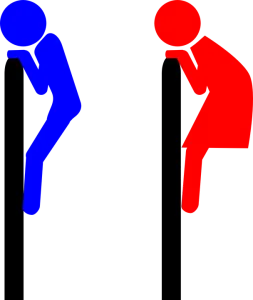I’ve worked as the director of training at The Sophisticated Dog, a pet training business in Los Angeles, and I’ve had a lot of clients with older dogs that aren’t housebroken. While some of them recently adopted adult rescue dogs, others have owned dogs since they were puppies. Fortunately, that pup’s family was able to learn how to potty train an older dog in just a few weeks once they put a consistent housetraining plan into place. One family that hired me had a dog who had been pottying in the house for a couple of years—ever since she was a puppy.
Environment and Puppy Potty Training, Reason #3
Perhaps your dog has “solid nerves,” or as many dog behaviorists and obedience trainers refer to it, “genetically sound,” traits. Even more frequently used in the context of potty training dogs is the phrase “clean dog (vs. dirty dog)”
Even a dog with good genetics can be derailed by an unsuitable environment and puppy potty training program. For instance, due to a lack of resources, many puppy stores and shelters frequently let the puppies use paper in their crates before cleaning the crate and replacing the paper. Many puppies become accustomed to sitting in or near their crates or other containers until the attendant or volunteer cleans them because they are frequently trained to relieve themselves there. This puppy’s crate behavior may persist in their new residence, which is your residence.
It can be overcome, but it will take more time than if the puppy had started potty training without the help of a program of this kind. Which brings us to the final factor contributing to the delay in potty training our dog: consistency.
Expecting too Much Too Fast from Your Puppy’s Potty Training, Reason #1
Too many pet owners we encounter have high expectations for their puppy in terms of housebreaking and potty training, and impatience is the number one cause of delay. How quickly can we dispose of the crate, it seems like there is always a race!?
Undoubtedly, the biggest barrier for many puppy owners seeking effective potty training results is their desire to see results quickly in the game of potty training.
There is nothing wrong with setting the bar high for our canines (after all, we promote this ideology to our children);  however, it is very important to understand that expectations must be realistic too and you MUST consider:
however, it is very important to understand that expectations must be realistic too and you MUST consider:
3) Duration away from the home
4) How well he or she is progressing with potty training at home
Potty training your puppy is a progression. Yet so many puppy owners choose to “cross their fingers” and disregard the aforementioned factors. Avoid doing it; you’ll probably realize your mistake later. This is due to the fact that we are imprinting the wrong message on our puppy by leaving it at home too early and returning to a mess. And just like any habit, it takes longer to break the stronger it gets.
Stay outdoors for some playtime after potty time.
Stay outside after the dog urinates; if you immediately go inside, your dog will learn that urinating ends fun outdoor time, and they might hold it longer so they can stay outside longer. Spend at least 10 minutes outside after your dog urinates to ensure that they quickly learn that going potty earns them more outdoor fun.
FAQ
What age is too late to toilet train a dog?
The majority of puppies should be fully potty trained between the ages of six and 18 months, with an average of one year, barring any medical conditions or other pressing circumstances. Here are some helpful hints on how to potty train your puppy if you’re having trouble.
Can a dog be potty trained at 3 years old?
Adult dogs might need a refresher on house training if you’ve noticed a regression, or they might never have understood that they should only relieve themselves outside. Some dogs require assistance making the switch from using pee pads to only going outside.
Is it ever too late to train a dog to pee outside?
The short answer is: no. Although training an older dog can be more challenging than training a young one, it’s never too late to train a dog as long as you’re willing to put in the time, patience, and persistence needed to establish boundaries, form new habits, and stop destructive behaviors.
Is 5 months too late to potty train a puppy?
A puppy must be fully housetrained for 4-6 months on average, but some can take up to a year. Size can be a predictor. For instance, smaller breeds require more frequent trips outside because their bladders are smaller and their metabolisms are higher. Your puppy’s previous living conditions are another predictor.